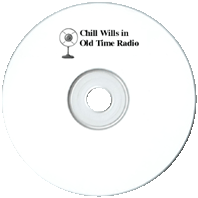

Chill Wills was born in Texas, but at an age when other boys were thinking about running away to become cowboys, Wills joined the vaudeville circuit.

5 old time radio show recordings
(total playtime 2 hours, 4 min)
available in the following formats:
1 MP3 CD
or
3 Audio CDs
Text on OTRCAT.com ©2001-2026 OTRCAT INC All Rights Reserved. Reproduction is prohibited.
Chill Wills
(1902 – 1978)

Whether the legend of the singing cowboy was based on any actual truth is debatable, but the concept was a popular one with Hollywood movie producers. Western movies were popular and relatively cheap to make, especially with the glut of out-of-work cowboys who found their way to Hollywood. To save even more money on a B-grade Western, producers discovered that with Singing Cowboys, the script could be padded with songs rather than more expensive to shoot action scenes.
The most famous Singing Cowboys were Gene Autry and Roy Rogers. "The Duke" John Wayne even appeared as a singing cowboy early in his career when he played "Singin’ Sandy Saunders" in Riders of Destiny (1933).Not every singing cowboy got their start as a cowboy, of course. Chill Wills was born in Texas, but at an age when other boys were thinking about running away to become cowboys, Wills joined the vaudeville circuit.

Wills appeared in a number of A- and B-list Westerns, in both singing and non-singing roles, including Rio Grande (1950) and McLintock! (1963) with John Wayne and with Rock Hudson, James Dean and Elizabeth Taylor in Giant (1956). Wills most popular role was the voice of Francis in the Francis the Talking Mule film series during the 1950's. The deep-voiced and cynical Army mule Francis was the inspiration for TV’s Mr. Ed during the 1960's.
Wills died of cancer at his home in Encino, California, in 1978. He was 76. A Star on the Hollywood Walk of Fame at 6923 Hollywood Blvd honors Chill Wills’ contributions to Motion Pictures.
Text on OTRCAT.com ©2001-2026 OTRCAT INC All Rights Reserved. Reproduction is prohibited.
You have reached the maximum number of votes for a unregistered user.
Please login or create a new account to continue...
You have reached the maximum number to down votes in this page.



Chill Wills Disc A001
|
Add Audio CD to Cart - $5.00 |
Chill Wills Disc A002
|
Add Audio CD to Cart - $5.00 |
Chill Wills Disc A003
|
Add Audio CD to Cart - $5.00 |
Please wait...
COMMENTS
Be the first to comment on "Chill Wills"
Leave a comment